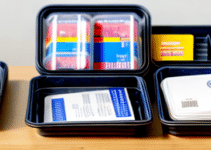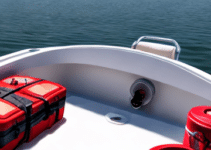Emergency food and water supply is essential to ensure that nonperishable food and long-lasting water remain fresh and safe to consume in case of emergencies.
Click here to learn more about: ‘ patriot
Choose Best NonPerishable Emergency Food
Life of the nonperishable food includes a well-stocked assortment of canned food and bottled water, ready to sustain during emergencies or disasters. Choose options that have a long shelf life, as they will last longer and be more reliable during an emergency.
It is also important to check the expiration dates and rotate your emergency food supply to ensure that you are always consuming fresh and safe food.
In addition to nonperishable food, having an adequate water supply is crucial during emergencies.
It is recommended to have at least one gallon of water per person per day for drinking and sanitation purposes. Consider storing water in containers that are specifically designed for long-term storage, and regularly check and replace water as needed. When it comes to preparing for emergencies, it is essential to have a well-stocked food supply, including long-lasting water, canned food, and bottled water, ensuring your emergency supplies are always ready for any disaster.
Water Importance of Stockpiling NonPerishable Food
Water is an essential resource that should never be underestimated when it comes to stockpiling shelf-stable food for emergencies. While having a supply of shelf-stable food is crucial, it is equally important to prioritize access to clean and purified water.
During disasters, such as hurricanes or earthquakes, the availability and quality of drinking water can be severely compromised.
Relying solely on nonperishable food without a sufficient water supply may not be enough to ensure survival.
Therefore, it is important to consider the amount of water needed for drinking and sanitation purposes, and have reliable methods for purifying water at hand. Regular disaster preparedness includes stocking up on shelf-stable food, purified water, and other essential survival supplies.
Stockpiling Shelf-Stable Food and Water
- Water is a vital resource for survival, as the human body can only survive a few days without it.
- During emergencies, such as hurricanes or earthquakes, access to clean drinking water may be limited or compromised due to infrastructure damage.
- Relying solely on nonperishable food without an adequate water supply can lead to dehydration and further health risks.
- Having a sufficient supply of purified water is essential not only for drinking but also for sanitation purposes during disasters.
Water for Emergencies Essential Tips for Storing NonPerishable Food
In times of emergencies, it is crucial to have a reliable water supply, just like stocking up on MREs and emergency meals for disaster preparedness food and ensuring emergency hydration. Access to clean and safe water is essential for hydration, rehydrating dehydrated foods, and cooking meals.
Knowing how much water to store and how to maintain an adequate supply can be challenging.
In this section, we will explore the role of water in emergency food preparation and preservation.
We will provide tips on effectively rationing water and maintaining a well-rounded emergency food supply that includes canned goods, emergency nutrition, disaster preparedness food, and other emergency hydration items. It is important not to overlook the significance of emergency hydration and the essential role it plays in disaster preparedness, including the availability of emergency drinking water.
Water for Disaster Situations Prepare NonPerishable Food
When it comes to emergency preparedness food, having nonperishable provisions with a long shelf life is crucial for ensuring the availability of essential sustenance during times of crisis. These types of emergency essentials can be life-saving in disaster situations, as they provide sustenance that does not require cooking or refrigeration.
It is important to properly store these nonperishable items to ensure their freshness and safety for consumption.
Alongside food storage, it is equally essential to have an ample supply of water.
Adequate water storage is vital for hydration and overall health during times of crisis. By being prepared with both nonperishable food and water, you can navigate through disaster situations more easily and ensure the well-being of yourself and your loved ones with essential emergency provisions and long shelf life sustenance to rely on.
Emergency Preparedness Food
- Nonperishable provisions with a long shelf life are crucial for ensuring the availability of essential sustenance during times of crisis.
- Emergency essentials that do not require cooking or refrigeration can be life-saving in disaster situations.
- Properly storing nonperishable items ensures their freshness and safety for consumption.
- Adequate water storage is vital for hydration and overall health during times of crisis.
Water Essential Tools
Having the right tools is crucial when it comes to ensuring a reliable and safe water supply, as well as having emergency hydration packs and nonperishable nourishment as part of your survival essentials. In emergency situations or when access to clean water is limited, these water essential tools are indispensable.
Alongside water filters, storage containers, and purification tablets, there are other important tools to consider.
One such tool is a water testing kit, which helps in detecting contaminants and measuring the pH levels of the water.
It is important to have a water pump or siphon for extracting water from various sources. These tools play a vital role in providing clean drinking water and maintaining hydration during times of crisis
Equipment for Storing NonPerishable Food
Meats, fruits, and vegetables can be complemented with emergency food kits, survival water filters, and nonperishable sustenance supplies for optimal readiness in uncertain situations. In addition to airtight containers and vacuum sealers, it is also important to have a reliable water supply for emergencies.
Having a sufficient amount of clean drinking water is crucial for survival, as water is essential for hydration and food preparation.
When storing nonperishable food, it is important to rotate your stock regularly to ensure that you are using the oldest items first.
This can help prevent food waste and ensure that you are consuming the freshest products. It is important to store nonperishable food in a cool, dry place away from direct sunlight.
This can help maintain the quality and shelf life of the food.
Storing nonperishable food requires the right equipment and proper storage techniques. Airtight containers and vacuum sealers are essential for storing nonperishable sustenance supplies, emergency nutrition packs, and canned emergency food to ensure long-lasting hydration during uncertain times.
Storing Nonperishable Food
- Rotating your stock regularly helps prevent food waste and ensures consumption of the freshest products.
- Storing nonperishable food in a cool, dry place away from direct sunlight helps maintain its quality and shelf life.
- Airtight containers and vacuum sealers are essential for storing nonperishable sustenance supplies, emergency nutrition packs, and canned emergency food to ensure long-lasting hydration during uncertain times.
- Having a reliable water supply is crucial for survival, as water is essential for hydration and food preparation.
Water NonPerishable Food
When it comes to ensuring your emergency food supply, it is crucial to consider the importance of water and nonperishable snacks for disaster relief and survival. It is essential to have emergency hydration packs and water storage containers to provide a reliable source of clean drinking water during uncertain times. Nonperishable snacks, like granola bars and dried fruits, can offer essential nutrients and energy when regular meals may not be available.
By including both water and nonperishable snacks in your emergency preparedness plan, you can better equip yourself and your family for any disaster relief situation that may arise
Water A Lifeline During Disasters Role of NonPerishable Food
In addition to providing hydration, nonperishable food items are crucial for meeting nutritional needs during emergencies, especially when included in emergency food supply kits. These specially designed food options offer long-lasting nutrition, making them an essential component of disaster preparedness.
When access to fresh food is limited or unavailable, having a stockpile of nonperishable snacks and meals ensures that individuals have access to vital sustenance.
Incorporating these types of food into meal planning during emergencies can help maintain a balanced diet and provide a sense of normalcy amidst chaos. From emergency food supply kits to survival water treatment, there are various options available to ensure adequate emergency nourishment and nonperishable food items or emergency hydration solutions for disaster preparedness water.
| Benefits of Nonperishable Food Items | Importance of Emergency Food Supply Kits |
|---|---|
| Long-lasting nutrition | Ensures access to vital sustenance |
| Contributes to balanced diet | Provides a sense of normalcy |
| Crucial for meeting nutritional needs during emergencies | Essential component of disaster preparedness |
Water in Emergency Hydration
When it comes to emergency situations, having access to clean and safe drinking water is crucial for long-lasting sustenance and survival. In times of crisis, it may be difficult to find enough water, so having a plan in place is essential.
This article will provide valuable insights on how to ensure an adequate water supply during emergencies.
We will cover topics such as water storage and purification techniques, alternative water sources, hydration guidelines, and water conservation tips.
We will discuss different types of containers that are suitable for long-lasting water storage in emergency situations
Nutrition Ensure Safety
When it comes to ensuring the safety and well-being of individuals, emergency water storage containers and nonperishable survival provisions play a crucial role. A balanced diet that provides essential nutrients is important for overall health.
In addition to considering the quality of food and portion sizes, it is also essential to focus on nonperishable food and water supplies and emergency hydration systems.
Nonperishable food items are invaluable during emergencies or for long-term storage, providing a reliable source of nutrition when fresh food is not readily available.
It is equally important to have a well-stocked emergency food supply in case of unforeseen circumstances. Maintaining a sufficient water supply is critical for hydration and overall health. Individuals should have emergency water storage containers and be familiar with disaster relief, ensuring they are equipped with nonperishable survival provisions and emergency hydration systems.
Emergency Water Storage and Nonperishable Survival Provisions
- Emergency water storage containers provide a reliable source of clean drinking water during emergencies or when fresh water is not readily available.
- Nonperishable food items are essential for long-term storage and emergencies, as they can provide necessary nutrition when fresh food is scarce.
- Having a well-stocked emergency food supply ensures individuals are prepared for unforeseen circumstances and can sustain themselves during challenging times.
- Maintaining a sufficient water supply is critical for hydration and overall health, especially in emergency situations where access to clean water may be limited.
Quality of NonPerishable Emergency Food
In addition to shelf life, the nutritional value of nonperishable emergency food aid is also crucial. Emergency food aid should be packed with longlasting nutrition bars and emergency hydration solutions to ensure individuals receive the necessary nutrients and hydration during emergency situations.
Nonperishable food storage should include survival water treatment tablets to guarantee the safety of drinking water.
Furthermore, emergency nutrition kits and nonperishable sustenance supplies should be included in emergency preparedness plans to provide a sufficient food supply for an extended period
Essential Camping Supplies Emergency Food Water
Stay Prepared Durable Emergency Food Water





